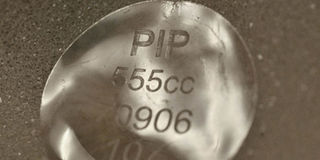Countries now warn on French breast implants

Close up on a French-made PIP breast implant taken on December 30, 2011 at La Seyne-sur-Mer, south eastern France. Twenty cases of cancer have been discovered among women who have received allegedly faulty French-made breast implants, according to French consumer health agency AFSSAPS. PHOTO/ AFP/ BORIS HORVAT
What you need to know:
- Germany and the Czech Republic call for their removal as a ‘precautionary measure’
BERLIN, Saturday
Germany and the Czech Republic have advised women to have potentially faulty breast implants made by French firm PIP removed, but Britain said it was not convinced of the need.
Germany’s Federal Institute for Medications and Medical Products (BfArM) recommended that implants made by the firm at the heart of the scandal should be removed “as a precautionary measure”.
The Czech health ministry gave similar advice to up to 2,000 women there.
And while Britain said there was no evidence requiring a general recommendation to remove the implants of some 40,000 women, it said those who had received them from the state-run National Health Service could have the prostheses removed free of charge.
About 300,000 women in 65 countries are estimated to have received implants made by Poly Implant Prothese (PIP), which allegedly used an illegal industrial-grade gel that investigators say has led to abnormally high rates of ruptured implants.
Some estimates of the number of women affected are higher.
France has already advised the removal of the PIP implants, while 13 other countries in Europe and in Latin America have urged women to get regular checkups.
Two of them of them — Bolivia and Venezuela — are offering operations to have the prostheses removed.
Australia, however, has said it found no evidence that the implants posed a risk.
French police are investigating the now-defunct PIP and its founder Jean-Claude Mas, 72.
According to the minutes of a police interview conducted in October and seen by AFP, Mas admitted to investigators that he switched the gel and hoodwinked quality inspectors in order to boost profits.
The scandal has led to more than 450 lawsuits filed in three countries.
(AFP)




